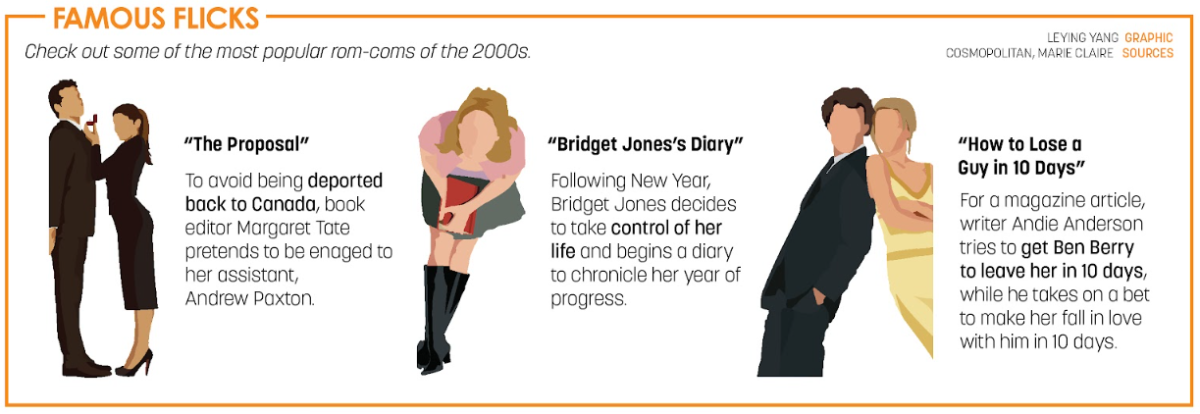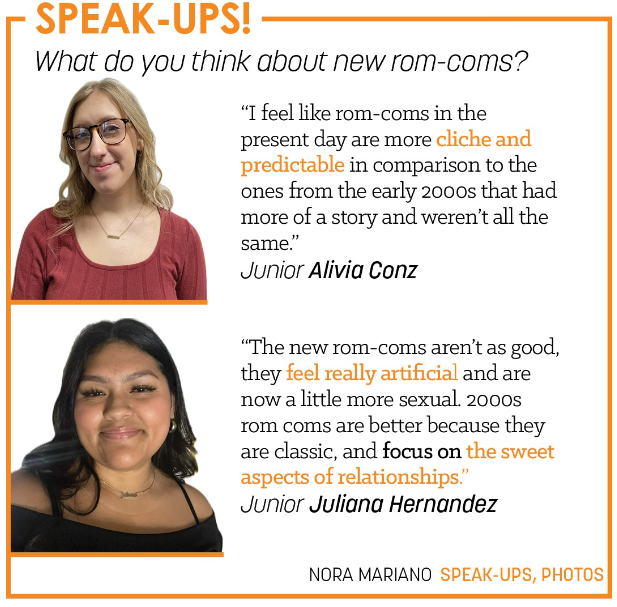We can all think back to that specific era in pop culture that was the 2000s rom-com obsession. My personal favorite is “The Proposal” with Ryan Reynolds and Sandra Bullock but there are many notable titles to mention. Films such as “She’s the Man,” “Bridget Jones’s Diary” and the iconic “How to Lose a Guy in 10 Days” graced the screens of viewers around the world.

The rom-com is a staple of cinema everywhere, however, rom-coms in recent years haven’t garnered the same level of attention and praise as they did back in the 2000s. Try as they might, rom-coms in recent years aren’t at the same level of fame which is curious considering other film genres have only gotten better. Action movies of the past pale in comparison to the success of Marvel and the market for horror movies only continues to grow with blockbuster hits. So why is it that the most appreciated rom-coms are from so long ago?
For one, the plot is much harder to develop because of the nature of modern life. So much of our life now revolves around phones and as a whole, we are much more connected because of technology that wasn’t available in the 2000s. The “Will they? Won’t they?” aspect of olden day rom-coms is practically eliminated. The viewer isn’t held in suspense on if the protagonists will fatefully run into each other again or if (character 1) will make it to the airport before (character 2)’s flight because (character 1) could simply text (character 2).

What’s more is the industry is running out of original situations to put their characters in. What used to be new and captivating 20 years ago is now nothing but a cliche that doesn’t attract viewers to the movie theaters. A big misunderstanding that almost breaks them up? Seen that. It was all a bet? Boring. Junior Ren Sethupathi agrees with my sentiment and said, “2000s rom-coms are timeless. But I think they did everything possible, so rom-coms now just feel recycled.”
This problem compounds as the rom-com industry is becoming less and less attractive for actors, meaning the same actors end up starring in most of the movies. There isn’t as much of a variety of talent which contributes to the demise of rom-coms everywhere; people can only watch the same actor in the same plot so many times.
On the other hand, there exists the opportunity for an exciting new change in rom-coms that could revolutionize the genre. Back in the 2000s, same-sex relationships were still very much taboo and queer characters didn’t have a space on peoples’ TV besides the occasional gay best friend. While discrimination is still rampant in the present day, queer characters and queer-focused shows are on the rise. Movies like “Red, White, & Royal Blue” and shows like “Heartstopper” are excellent examples of LGBTQ+ rom-coms that could be the savior of the whole industry. Rom-coms about queer characters would not only introduce fresh storylines and avoid cliches because so little prior media exists, they would also introduce new talent and jumpstart the careers of undiscovered queer actors.































![What happened to theater etiquette? [opinion]](https://hilite.org/wp-content/uploads/2025/04/Entertainment-Perspective-Cover-1200x471.jpg)














































![Review: “The Immortal Soul Salvage Yard:” A criminally underrated poetry collection [MUSE]](https://hilite.org/wp-content/uploads/2025/03/71cju6TvqmL._AC_UF10001000_QL80_.jpg)
![Review: "Dog Man" is Unapologetically Chaotic [MUSE]](https://hilite.org/wp-content/uploads/2025/03/dogman-1200x700.jpg)
![Review: "Ne Zha 2": The WeChat family reunion I didn’t know I needed [MUSE]](https://hilite.org/wp-content/uploads/2025/03/unnamed-4.png)
![Review in Print: Maripaz Villar brings a delightfully unique style to the world of WEBTOON [MUSE]](https://hilite.org/wp-content/uploads/2023/12/maripazcover-1200x960.jpg)
![Review: “The Sword of Kaigen” is a masterpiece [MUSE]](https://hilite.org/wp-content/uploads/2023/11/Screenshot-2023-11-26-201051.png)
![Review: Gateron Oil Kings, great linear switches, okay price [MUSE]](https://hilite.org/wp-content/uploads/2023/11/Screenshot-2023-11-26-200553.png)
![Review: “A Haunting in Venice” is a significant improvement from other Agatha Christie adaptations [MUSE]](https://hilite.org/wp-content/uploads/2023/11/e7ee2938a6d422669771bce6d8088521.jpg)
![Review: A Thanksgiving story from elementary school, still just as interesting [MUSE]](https://hilite.org/wp-content/uploads/2023/11/Screenshot-2023-11-26-195514-987x1200.png)
![Review: "When I Fly Towards You", cute, uplifting youth drama [MUSE]](https://hilite.org/wp-content/uploads/2023/09/When-I-Fly-Towards-You-Chinese-drama.png)
![Postcards from Muse: Hawaii Travel Diary [MUSE]](https://hilite.org/wp-content/uploads/2023/09/My-project-1-1200x1200.jpg)
![Review: "Ladybug & Cat Noir: The Movie," departure from original show [MUSE]](https://hilite.org/wp-content/uploads/2023/09/Ladybug__Cat_Noir_-_The_Movie_poster.jpg)
![Review in Print: "Hidden Love" is the cute, uplifting drama everyone needs [MUSE]](https://hilite.org/wp-content/uploads/2023/09/hiddenlovecover-e1693597208225-1030x1200.png)
![Review in Print: "Heartstopper" is the heartwarming queer romance we all need [MUSE]](https://hilite.org/wp-content/uploads/2023/08/museheartstoppercover-1200x654.png)


